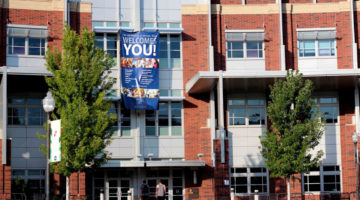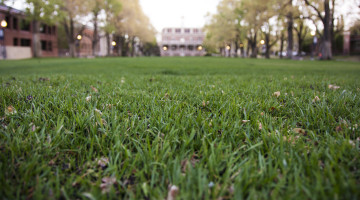
Photo Courtesy of Brady J. Johnson, National Judicial Collage. Supreme Court Justices Cherry (center), Gibbons (left) and Douglas (far right) hear cases at the National Judicial College on Wednesday, Sept. 14. The two cases include a land-use and murder case.
Nevada Supreme Court Justices Michael Cherry, Michael Douglas and Mark Gibbons heard two cases Wednesday, Sept. 7 at the National Judicial College. The panel has been touring the state to hear cases in front of the public at various high school and college campuses. During these cases, students are invited to listen and engage as both lawyers argue their cases. Each case is followed by a Q&A session where the audience may ask anyone in the courtroom questions that do not relate to the cases just heard.
Nevada Sagebrush: How and why did you become a Supreme Court Justice?
Justice Cherry: I knew I wanted to become a judge at a young age from watching judges hear cases. So I became a judge in 1999, I was re-elected in 2002, but I ran without opposition. In 2006 Justice Rose retired from the Supreme Court so I ran in his position, and in 2012 I ran and got re-elected. So I was a district court judge for eight years, and I’ve been over here for nine years.
Justice Gibbons: As a judge you can run and be elected onto the [Nevada] Supreme Court, like Justice Cherry and I. Or you can be appointed by the governor like Justice Douglas was. He was appointed by Gov. Kenny Guinn in 2004.
NS: Why did the panel choose to hear your case at the Judicial College?
JC: When I became Supreme Court justice I did not do that much campaigning because I didn’t have an opponent. So then Mark Gibbons, who is on this panel, recommended that we go tour rural Nevada. So we tour these high schools or wherever and we have actual cases. We’ve been all over rural Nevada — I’ve been to Panaca, Tonopah, Fallon, Sparks, we’ve been to Winnemucca twice, Elko, we’ve been to Reno a couple of times, we went to Reno High School and Bishop Gorman. So you name a place, we’ve been there.
We hear actual cases with actual lawyers. And there are students or public officials who come to watch. At the end of the session we do a Q&A with the students; we can’t talk about the cases, but we can talk about being a lawyer, and this way people get a taste of exactly what we do. People usually know about trials, but they don’t know where it goes from there, so that’s why we’re doing it — to show people what exactly the Supreme Court does. I’ve always been happy with the turnout and my experience at the Judicial College, so this is kind of paying them back for the good experiences I’ve always received.
NS: What is the most interesting case you have ever heard?
JC: Well, we just had the ESA case, the education savings case. We haven’t even made a decision on that case, but every time the Legislature does something or the Constitution is amended, we have interesting cases. We’ve had cases involving minimum wage; we have all of the criminal cases and all of the death penalty cases that come up to us. We do not lack interesting cases. I do not have a particular favorite; there have been all kinds. So you name it, we’ve had it.
JG: I had a case — it was really sad — of a girl who had smoked marijuana and got into her car. She ended up falling asleep behind the wheel and running off the road where she hit and killed six people who were cleaning up trash on the side of the highway. This girl was young, but she killed six people and you have to think about those people’s families.
Justice Douglas: I had an assault case where the victim took the stand near the end of the case, and as the prosecuting lawyer was asking him questions, he was demonstrating the way the victim was choked. But as the lawyer was demonstrating how the victim was choked, he had his hands around the victim’s neck and was actually putting pressure on him to the point where he had trouble breathing. You should never put your hands around or even touch people on the stand, so I had to stop him and calm everyone down.
NS: These cases seem like they could be really emotionally draining. Do you have a method of dealing with really hard cases, like separating yourself from the case after it is over?
JG: We do get a lot of really, really tough cases. I think the worst ones are sexual assault cases, especially when the victim is alive and testifies during the case. The worst are child sexual assault cases. And you just have to sit here and listen to the case, make a decision, and then separate yourself from it when you get home at night.
JD: It is part of the job. There are really difficult cases that I heard years ago and still remember like they were yesterday.
JG: DUI cases are hard too, because they are these underage kids who have a drink or young adults who have one drink too many and get into their car and hurt someone.
JD: I heard a case of a boy who was a basketball star. He was set to go to college on a basketball scholarship. He had a clean record and a loving family, had great grades, and worked a part-time job. He was driving home after a work holiday party where he had drunk one too many drinks. He ended up hitting a car and killing a son and his father. Those are hard because you have the boy on one hand with a clean record, a future and his family who was devastated. But you have the family of the son and the father who lost their family members forever. Those are really difficult.
NS: What are the most common cases you hear in Nevada?
JC: Well, we hear a lot of criminal cases. That is a big part of our agenda. We also have a lot of personal injury cases where people are involved in getting hurt. We have a lot of cases of breach of contract — business cases where people have entered into a business arrangement and something has gone sour. That’s when one party sues the other. We have a lot of family law cases, involving divorce, juvenile sentences, neglect and abuse of children.
NS: How has the Court of Appeals’ creation changed your jobs and the cases you hear?
JC: We’re in our second year with the Court of Appeals. It started with three judges, two in Las Vegas and one up here in Reno. They have taken some of the burden off us. They handle the same type of cases we handle. There are certain cases that the Constitution says we have to handle, like ballot questions and bar matters that involve the State Bar of Nevada. We handle the big criminal cases. They have been a help; it is really good to have them.
NS: What advice do you have for people hoping to someday be in a position similar to your own?
JG: Stay in school. Go to a law school and study hard.
JD: It’s OK to not know what you want to do when you’re young. I thought I was going to be in education. My entire family is in education; I really enjoyed it, but I found out I had a passion for law.
JG: A lot of people practice something and then realize later in life that they want to pursue law, so it isn’t too late to change your mind.
The news desk can be reached at rspacek@sagebrush.unr.edu and on Twitter @TheSagebrush.











